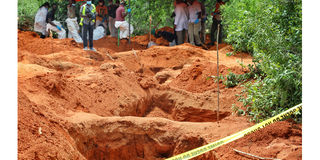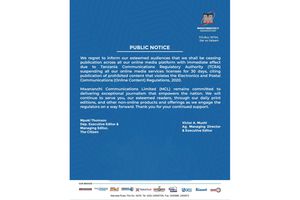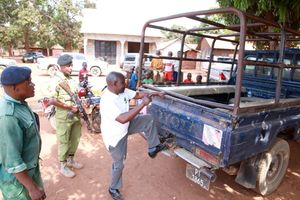Prime
Freedom or fraud? Legal loopholes shielding Tanzania's rogue pastors

Shakahola Forest exhumation scene. Commentators want the government to intervene to prevent what happened in Kenya with the Shakahola forest killings. PHOTO | FILE
What you need to know:
- The rogue religious leaders claim their activities are legitimate, citing these constitutional provisions
Dar es Salaam. Some pastors are leveraging the freedoms enshrined in the Tanzanian Constitution to justify wrong actions, The Citizen has learned.
These actions include exploiting the vulnerable by staging miracles, selling items, and faking testimonies to amass wealth.
However, these pastors, some of whom identify themselves as 'prophets', claim to be protected by the constitution, which guarantees freedom of religion.
One church elder asserted; “Do you not read the constitution and laws regarding religious matters? Do you think the government does not see or follow up?”
“Religion is a matter of faith and cannot be interfered with, as long as we don’t breach the law,” he continued.
This elder argued that the constitution allows them to worship and believe freely without threatening national security.
“The government recognises the importance of 'men of God' according to the constitution and the country's laws. Therefore, interfering with matters of faith as a government would be going against the constitution,” the source added.
The Constitution of the United Republic of Tanzania provides religious freedom.
Article 19(1) states, “Every person is entitled to the freedom of thought, belief, and choice in religious matters, including the freedom to change their religion or belief.”
Section (2) ensures that the activities of religious communities are free from state interference. It stipulates that proclaiming religion, worship, and spreading religion are voluntary and outside state control.
Article 20(1) emphasises the right to assemble and associate peacefully with others, to express views publicly, and to join associations formed to preserve or promote beliefs or interests.
The constitution's protections have created a grey area.
The rogue religious leaders claim their activities are legitimate, citing these constitutional provisions.
They argue they are free to conduct their ministries without government interference.
“We have followers who have common sense. No one should come to a place that is very dangerous, yet he is a PhD holder, for example. We are just doing what God requires,” one of them claims.
Tax exemption conundrum
In Tanzania, tax exemptions are common for organisations, including religious ones.
The Tanzania Revenue Authority (TRA) grants exemptions to non-profit entities that significantly benefit society.
This includes religious organisations providing aid. TRA regulations allow religious institutions to be tax-exempt if 75 percent of their revenue supports community services, such as health and education.
“This is the loophole these individuals exploit to deceive believers, knowing that the government or no authority will question them,” noted a social affairs expert, Dr Joram Masiaga.
He pointed out that millions collected by these pastors through selling items are often not taxed unless the church owner decides to open up a business.
“The church owner decides how to use these funds,” he added.
Lack of specific regulations leaves many followers vulnerable.
In Tanzania, religious organisations must register with the Registrar of Societies at the Ministry of Home Affairs on the mainland and with the Chief Government Registrar in Zanzibar.
Registration requires at least ten followers, a written constitution, leaders' resumes, and a letter of recommendation from the district commissioner.
Once registered, the only government interference is during registration renewal or if they breach registration terms.
The Registrar of Societies conducts verification and renewal, requiring financial and performance reports along with a Sh100,000 fee.
However, this process often fails to scrutinise the activities of some controversial religious leaders effectively.
Psychologists and theologians highlight the growing trend of pastors exploiting their faith to accumulate wealth.
“Rogue pastors use faith as a business model, knowing the government is unlikely to interfere,” a theologian and sociologist, Mr Yusuph Mkondya, stated.
He emphasised the need for clear laws and guidelines to manage religious institutions, especially those owned by individuals.
In Kenya, the cult killings of Shakahola, where many followers died under the influence of a rogue pastor, have raised alarm bells across East Africa.
Experts warn that Tanzania should not wait for similar tragedies.
They urge the government to establish a regulatory framework to prevent such abuses.
The South African way—remedy?
In South Africa, religious regulation is more structured.
The South African government requires religious organisations to register with the Department of Social Development.
The country’s religious institutions act mandates transparency, regular audits, and adherence to ethical standards.
This approach has helped balance religious freedom with public safety, avoiding the pitfalls seen in other regions.
Experts suggest Tanzania urgently develop a regulatory framework.
This framework should define the limits of religious activities, ensuring they protect believers while preventing exploitation.
“We should establish clear requirements for registration and regular audits of religious organisations and have financial transparency, mandating detailed financial reporting to ensure funds are used for intended purposes,” Dr Masiaga noted.
A catechist, Mr Thomas Juma of the Catholic Church, said the protection of vulnerable groups should be a priority for whoever wants to register a church or a denomination.
“Implementing measures to safeguard followers from exploitation and abuse should be emphasised,” he said.
They advocate for a dialogue between the government and religious leaders to create a balanced approach.
This dialogue should focus on promoting healthy religious practices while safeguarding public interests.
“We need to discuss how to conduct religious activities responsibly and support the vulnerable in society,” Rev Osca Kibwana, a theologian, suggested.
As Tanzania, like many other countries, navigates this complex issue, experts stress the importance of not waiting for disasters to act.
“The government, religious leaders, and civil society must work together to ensure that freedom of religion is upheld without compromising public safety,” Rev Kibwana said in an interview.
“Tanzania can learn from countries like South Africa, which have successfully balanced religious freedom with necessary regulations.”
Efforts to reach the Ministry of Home Affairs for comment were unsuccessful.





